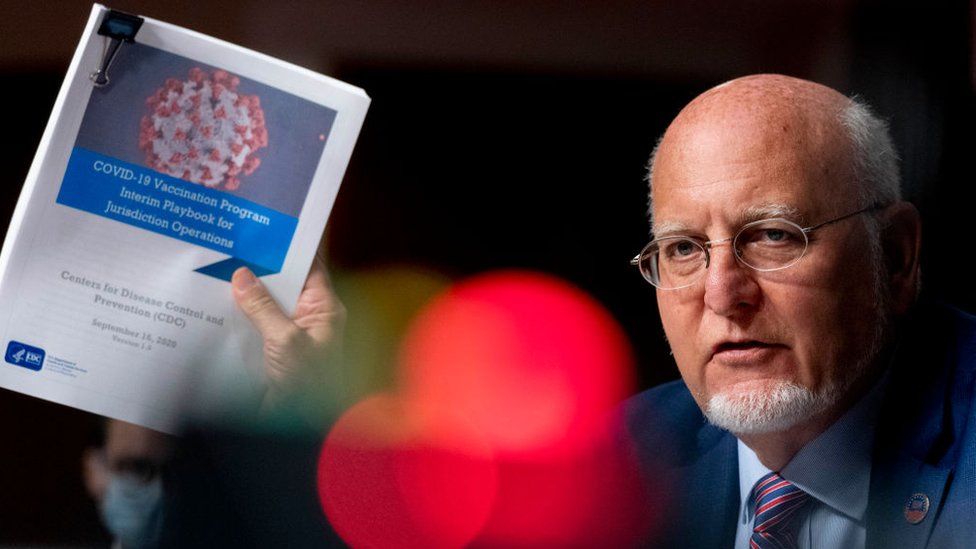Covid-19 origin debate 'squashed', ex-CDC chief Dr Robert Redfield claims
- Published

The former head of the US Centers for Disease Control and Prevention has said he was "sidelined" over his views on the origins of the Covid-19 pandemic.
Dr Robert Redfield was the key witness in a US congressional committee's first public hearing as it investigates how the coronavirus emerged.
He said he was cut out of early discussions on where the virus came from because he suspected a lab leak.
The accusation was dismissed by Dr Anthony Fauci as "completely untrue".
Many scientists point out there is no evidence that Covid leaked from a lab.
The White House has said there is no consensus across the US government on the virus's origins.
Some studies suggest the virus made the leap from animals to humans in Wuhan, China, possibly at the city's seafood and wildlife market.
The market is near the Wuhan Institute of Virology, a world-leading virus laboratory that conducted research into coronaviruses.
Dr Redfield, who led the US Centers for Disease Control and Prevention when the outbreak began in 2020, was an early proponent of the lab leak theory.
He told the House select subcommittee, formed by the new Republican majority in the US House of Representatives, it was "not scientifically plausible" to him that the virus had natural origins.
He claimed he was "sidelined" at the beginning of the pandemic and excluded from meetings as his views were not in line with other major scientists like Dr Fauci, the de-facto face of the US pandemic response.
"It was told to me that they wanted a single narrative, and that I obviously had a different point of view," he said. "Science has debate and they squashed any debate."
Dr Fauci, who was not present at the hearing, denied Dr Redfield's accusation.
"No one excluded anyone," he told US news outlet Politico after the hearing.
"And the idea of saying that he was not wanted there because he had a different opinion … there were several people on the call who had the opinion that it might have been an engineered virus," said Dr Fauci, who retired from his government roles in December.
During his testimony, Dr Redfield also spoke of his opposition to so-called gain of function research, in which viruses are manipulated to become more infectious in lab environments.
He said that US agencies had likely funded such research at the Wuhan institute.
Divisive subject
The House panel, which consists of nine Republicans and seven Democrats, has said it aims to stay above the fray of partisan politics.
But that may prove difficult given the divisive subject matter.
On the panel is Republican congresswoman Marjorie Taylor Greene, who used Wednesday's hearing to air her concerns about decisions made by federal agencies during the pandemic.
At the outset of the hearing, Democrat Raul Ruiz protested the inclusion of witness Nicholas Wade, the author of a controversial book on race and genetics that has been endorsed by a former Ku Klux Klan leader.
Mr Ruiz argued Mr Wade had written a dangerous book and his testimony could not be relied upon, but Mr Wade defended his book and remained at the hearing.
The spectre of Donald Trump also hung over the proceedings, with Democrat Jamie Raskin suggesting the former president had been sycophantic and fawning in his approach to Chinese President Xi Jinping.
The House probe comes a week after FBI Director Christopher Wray said an unintentional lab incident was "most likely" how Covid originated.
A few days before that, the US Department of Energy said it had found the virus was most likely the result of a lab leak in Wuhan, but could only reach that conclusion with "low confidence".
In response to that, many scientists who have studied the virus said that there was no new scientific evidence pointing to a lab leak.
A natural origin is still the more likely theory, said Professor David Robertson, head of viral genomics and bioinformatics at the University of Glasgow.
Related Topics
- Published1 March 2023